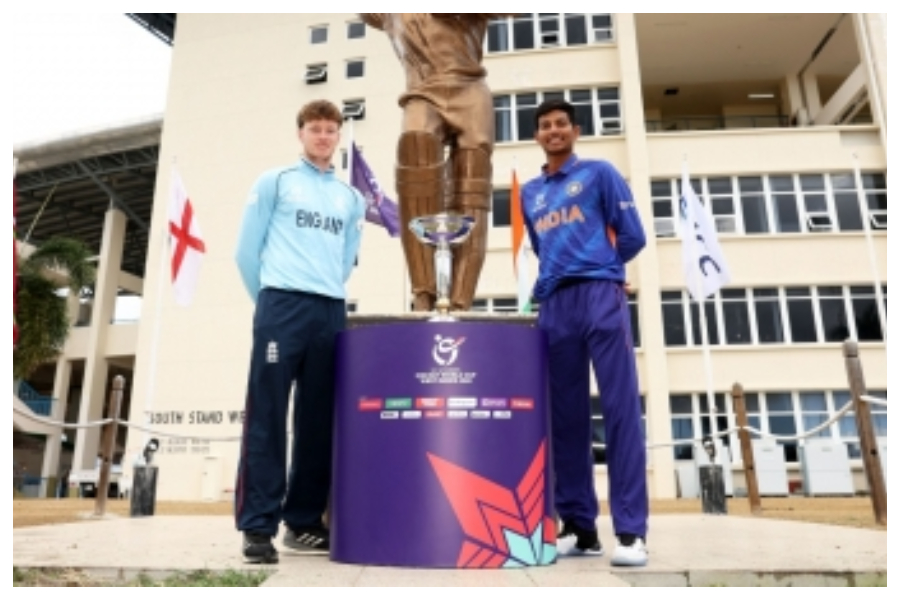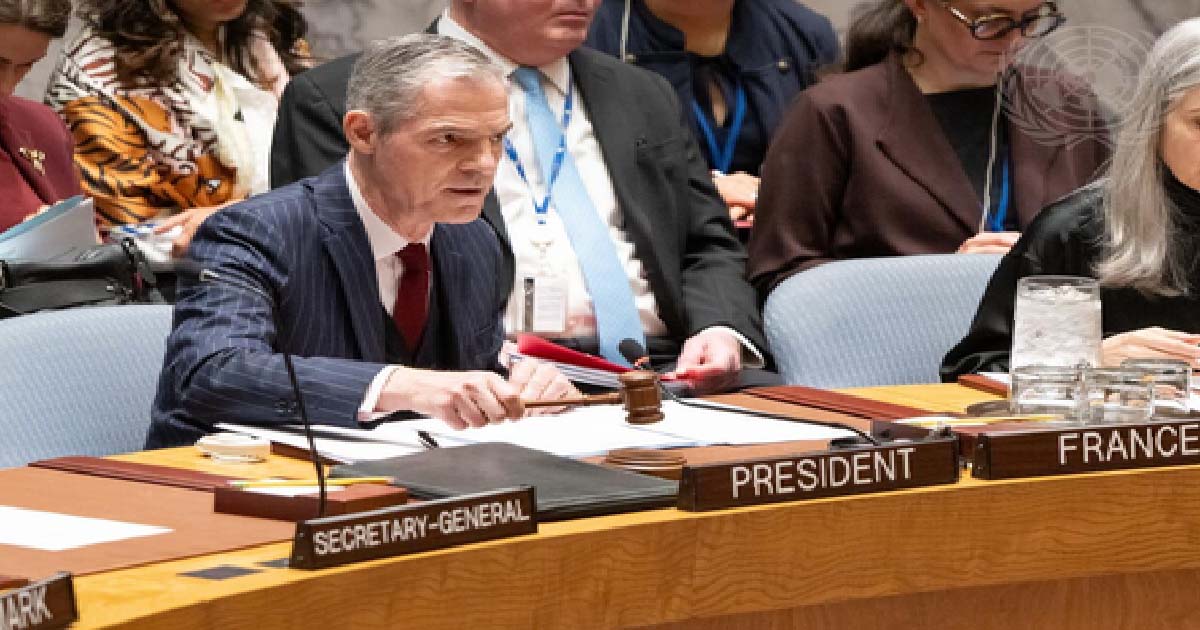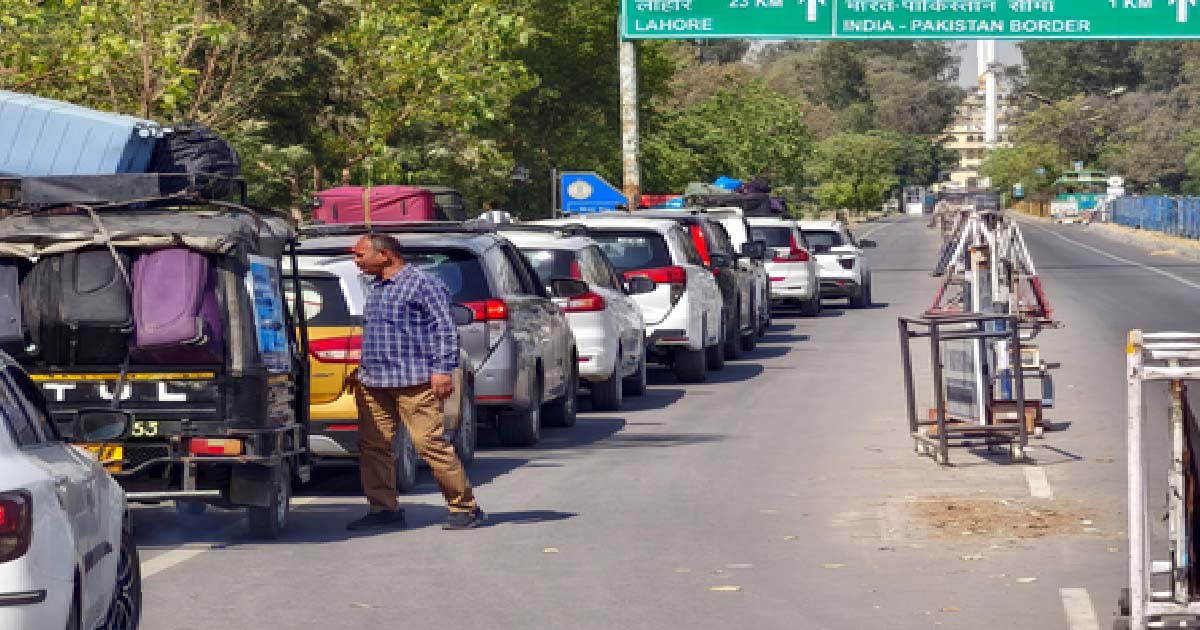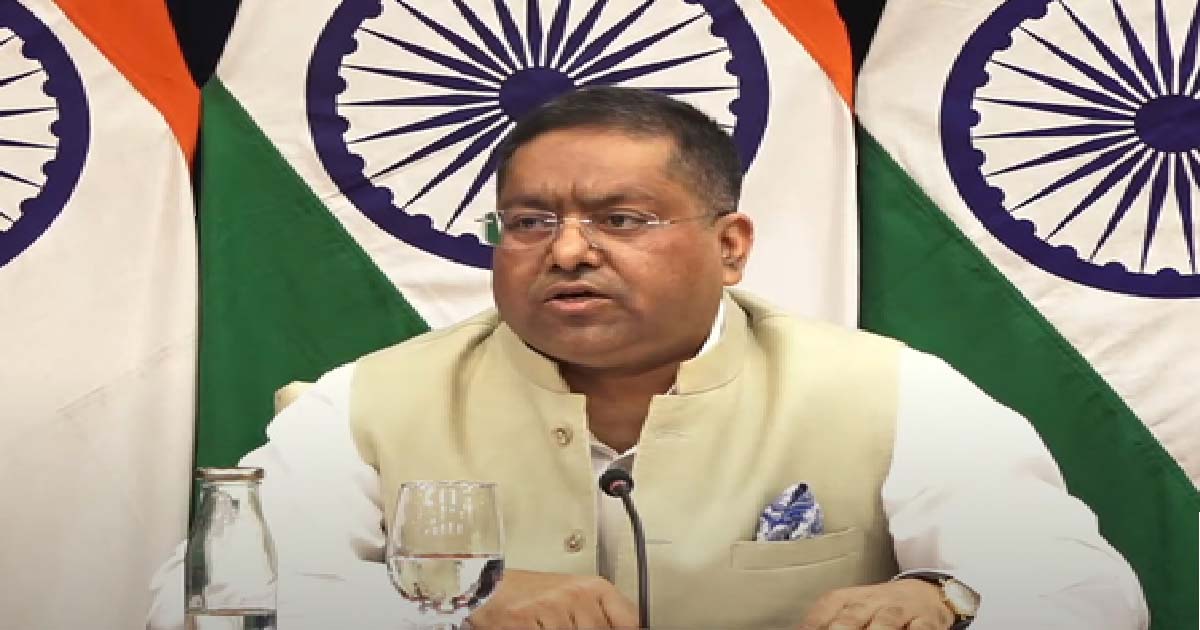International
U-19 CWC: Will try to blunt England batters by bowling dot balls, says Dhull

Ahead of the U-19 ICC Cricket World Cup final against England, India skipper Yash Dhull said that his team would like to control the rivals’ attacking game by bowling “as many dot balls as possible” to win the contest and claim their fifth title at the Sir Vivian Richards Stadium here later on Saturday.
Both India and England have so far remained unbeaten in the tournament, with the four-time champions having crushed Australia on way to setting up a title clash against the Tom Prest-led side.
Despite being mauled by COVID-19 early in their campaign, India have maintained their momentum throughout the tournament and with a full set of players to choose from for the final, they are the favourites to win their fifth title.
England, on the other hand, too have looked emphatic in their victories with Prest leading from the front.
“It will be a good challenge against England. They play attacking cricket and look to dominate the opposition. Our approach against them will be to bowl as many dot balls as possible. The team morale is high. We are excited to play the final. It’s the final but it is still just a game. So, we will play with the positive mindset, stick to the basics and we will look to execute our plans,” Dhull told ICC.
The Indian skipper said that Virat Kohli’s guidance ahead of the title clash had added to the team’s confidence.
“He (Virat Kohli) gave us his best wishes as the team is doing well. So, his words will give us confidence. When a senior player speaks with the team, the team morale gets a boost. He spoke to us about some basic things such as how to play normal cricket, how to stick to our game plan, etc. It was good to interact with him,” added Dhull.
England have enjoyed their best ICC U-19 Men’s CWC since their only title triumph 24 years back. Prest is only too aware of that history and how much his side has already achieved.
With the likes of Test skipper Joe Root and limited-overs captain Eoin Morgan having been in touch to offer their support, he is hoping to imitate the success of 1998.
“It’s the first time in 24 years that England have been in this final. I don’t know if we can believe it at the moment, we’re going to be playing in a World Cup final. It’s something you dream of growing up, so we’re all really excited and can’t wait to play.
“This morning we had messages from quite a few of the England senior team, saying that they had been following it and been really impressed with us. So it’s nice to know we have so much support from back home.
“They were saying that how impressed they have been with us and proud of what we have done getting to our first Under-19 Men’s Final in 24 years. It’s amazing to know they have been watching and following.
“We’ve tried to play that attacking brand of cricket that Eoin Morgan instilled in his squad. Whether that is with the bat, ball or field, we always try to take the positive option. That was one of the messages they were saying in their video they sent this morning – to not back down from the big occasion in the final and still play with that positive intent.”
England are familiar with the ground, having defeated South Africa and Afghanistan in the quarterfinal and semifinal, respectively. India though will be at a disadvantage having not played at the venue. But their impressive victories against 2020 champions Bangladesh in the quarters and then Australia in the semis should boost their morale.
Against Australia in the last-four clash, Dhull had cracked a century, and he is hoping for more of the same as India try to contain England’s big hitters.
Graeme Le Brooy will be the Match Referee for the final and the match officials standing in the game will be Roland Black of Ireland and Asif Yaqoob from Pakistan, according to ICC. Pakistan’s Rashid Riaz will be serving as the TV umpire and Jacqueline Williams from the West Indies will be the fourth umpire.
International
UNSC asks all countries to cooperate in bringing Pahalgam terrorists, backers to justice

United Nations, April 26: The Security Council has “condemned in the strongest terms” the Pahalgam terrorist attack and urged all countries to cooperate in bringing all those involved in the massacre, to justice.
The members of the Security Council “stressed that those responsible for these killings should be held accountable, and urged all States, in accordance with their obligations under international law and relevant Security Council resolutions, to cooperate actively with all relevant authorities in this regard”, Council President Jerome Bonnafont said in a Press statement on Friday.
A front organisation of the Pakistan-based terrorist group Laskhar-e-Tayiba has owned responsibility for the attack.
The statement issued by France’s Permanent Representative Bonnafont who is the Council president for this month, took a broad view of those involved in the massacre by including the financiers and sponsors.
“The members of the Security Council underlined the need to hold perpetrators, organisers, financiers and sponsors of this reprehensible act of terrorism accountable and bring them to justice”, the statement said.
Pakistan, which is on the Council as an elected member, went along with the other members in endorsing the statement, committing itself – at least on paper – to bringing those involved to justice.
A Press statement expresses the consensus of the Council and carries moral authority, while not being legally binding like a resolution.
The statement also shot down the attempts by some in Pakistan to give terrorist attacks a veneer of justification.
“The members of the Security Council reiterated that any acts of terrorism are criminal and unjustifiable, regardless of their motivation, wherever, whenever and by whomsoever committed”, it said.
The Council members “reaffirmed the need for all States to combat by all means, in accordance with the Charter of the United Nations and other obligations under international law, including international human rights law, international refugee law and international humanitarian law, threats to international peace and security caused by terrorist acts”, the statement added.
Earlier, the spokesperson for Secretary-General Antonio Guterres hinted that a diplomatic effort by him may be afoot.
Asked by a reporter, if Guterres would speak to leaders of India and Pakistan, Spokesperson Stephane Dujarric said that he hoped to have something to share on that later.
Reiterating the condemnation of the terrorist attacks, Dujarric said, “We again urge both the Government of India and the Government of Pakistan to exercise maximum restraint to ensure the situation does not deteriorate further.”
When a reporter asserted that the possibility that “two nuclear countries” might “go to war” was getting insufficient attention, Dujarric said, “I don’t agree with your comment. We are paying very close attention to the situation between India and Pakistan.”
International
Wagah-Attari border closure leaves several families in limbo

Islamabad, April 25: Pakistan and India’s decision to shut down the Wagah-Attari border crossing after the deadly Pahalgam terror attack has forced several citizens from both countries to cut short their visit and rush back home.
On Thursday, after both countries announced closure of border crossing and gave a deadline for citizens to leave for their respective countries, at least 28 Pakistanis nationals returned from India while 105 Indian citizens in Pakistan crossed over into India.
A Hindu family from Balochistan’s Sibi was reportedly denied entry into India after the closure of border crossing.
“We were on our way to Indore in Madhya Pradesh to attend a wedding. Seven members of our family were excited to join our relatives in India and take part in the celebrations. But upon reaching Wagah, we learned that the border had been sealed. We will spend the night at Dera Sahib in Lahore and head back home tomorrow,” said Akshay Kumar.
Meanwhile, a Sikh family from India, in Pakistan to attend a wedding, decided to leave for India immediately.
“We had come to Pakistan for a wedding. While the ceremony took place, several important rituals remained. Once we heard the border was closed, we decided to return immediately,” said Raminder Singh, an Indian national.
A Hindu family from Ghotki in Pakistan’s Sindh province, now residing in New Delhi, was visiting Pakistan for the last two months to meet their relatives. However, they are now unsure about getting permission to return to India.
“There are five of us, including my young son and daughter, uncle and aunt. We all hold Pakistani passports and were granted No Obligation to Return to India (NORI) certificate by India. But uncertainty looms now, said a family member named Indira.
“Families with cross-border ties often bear the brunt of rising tensions between the two neighbours. With tensions between Pakistan and India once again on the rise, human connections across borders are becoming the first casualty,” said Asif Memood, a Lahore-based journalist.
“The closure of the Wagah-Attari border has left many families in limbo, uncertain when they will next reunite with their loved ones,” he added.
International
Murder of Hindu leader: India slams Bangladesh, says killing follows pattern of systematic persecution of Hindu minorities

New Delhi, April 19: India on Saturday issued a sharp condemnation of the abduction and brutal killing of Bhabesh Chandra Roy, a prominent Hindu community leader in northern Bangladesh, calling it part of a “pattern of systematic persecution” of minorities under the country’s interim government.
Ministry of External Affairs (MEA) spokesperson Randhir Jaiswal voiced India’s grave concern, stating that the incident reflects an alarming trend of targetted violence against Hindus and other minority groups in Bangladesh.
“We have noted with distress the abduction and brutal killing of Shri Bhabesh Chandra Roy, a Hindu minority leader in Bangladesh. This killing follows a pattern of systematic persecution of Hindu minorities under the interim government, even as the perpetrators of previous such events roam with impunity,” Jaiswal said in a post on social media platform X.
He added, “We condemn this incident and once again remind the interim government to live up to its responsibility of protecting all minorities, including Hindus, without inventing excuses or making distinctions.”
India has previously expressed similar concerns over rising attacks on minorities in Bangladesh, but this latest incident has drawn particular attention due to Roy’s prominence in the Hindu community.
Roy, who served as the Vice-President of the Biral unit of the Bangladesh Puja Udjapan Parishad, was abducted from his residence in Dinajpur district on Thursday evening. According to police and family accounts, he received a phone call around 4:30 p.m., after which four unidentified men arrived on motorcycles and forcibly took him to Narabari village. He was reportedly assaulted and later found unconscious. He was rushed to a hospital in Dinajpur, where he was declared dead on arrival. His wife, Shantana Roy believes the attackers used the call to confirm his location before carrying out the abduction.
Opposition leaders in India also slammed the shocking incident in the neighbouring country.
Congress President Mallikarjun Kharge highlighted that religious minorities, especially Hindus, are being persecuted in Bangladesh.
“Attacks on other religious minorities are also continuing. Recently, the Chief Advisor of Bangladesh made a very condemnable and disappointing comment about the northeastern states of India. The persecution of religious minorities in Bangladesh, human rights violations, and the attempt to erase the memories of the 1971 Liberation War are efforts to weaken the relationship between India and Bangladesh. From 1971 till today, India has always wished for peace and prosperity for all the people of Bangladesh. This is in the best interest of the subcontinent,” he said.
-

 Crime3 years ago
Crime3 years agoClass 10 student jumps to death in Jaipur
-

 Maharashtra1 year ago
Maharashtra1 year agoMumbai Local Train Update: Central Railway’s New Timetable Comes Into Effect; Check Full List Of Revised Timings & Stations
-

 Maharashtra1 year ago
Maharashtra1 year agoMumbai To Go Toll-Free Tonight! Maharashtra Govt Announces Complete Toll Waiver For Light Motor Vehicles At All 5 Entry Points Of City
-

 Maharashtra1 year ago
Maharashtra1 year agoFalse photo of Imtiaz Jaleel’s rally, exposing the fooling conspiracy
-

 National News1 year ago
National News1 year agoMinistry of Railways rolls out Special Drive 4.0 with focus on digitisation, cleanliness, inclusiveness and grievance redressal
-

 Maharashtra1 year ago
Maharashtra1 year agoMaharashtra Elections 2024: Mumbai Metro & BEST Services Extended Till Midnight On Voting Day
-

 National News1 year ago
National News1 year agoJ&K: 4 Jawans Killed, 28 Injured After Bus Carrying BSF Personnel For Poll Duty Falls Into Gorge In Budgam; Terrifying Visuals Surface
-

 Crime1 year ago
Crime1 year agoBaba Siddique Murder: Mumbai Police Unable To Get Lawrence Bishnoi Custody Due To Home Ministry Order, Says Report
















